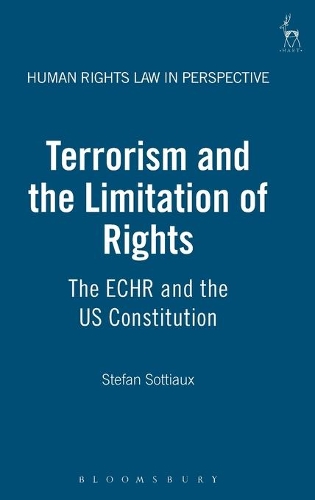
Terrorism and the Limitation of Rights: The ECHR and the US Constitution
(Hardback)
Publishing Details
Terrorism and the Limitation of Rights: The ECHR and the US Constitution
By (Author) Stefan Sottiaux
Bloomsbury Publishing PLC
Hart Publishing
29th February 2008
United Kingdom
Classifications
Professional and Scholarly
Non Fiction
Terrorism, armed struggle
Human rights, civil rights
342.08
Physical Properties
Hardback
472
Width 156mm, Height 234mm, Spine 37mm
Description
Taking as a starting point the widely accepted view that states confronted with terrorism must find a proper equilibrium between their respective obligations of preserving fundamental rights and fighting terrorism effectively, this book seeks to demonstrate how the design and enforcement of a human rights instrument may influence the result of that exercise. An attempt is made to answer the question how a legal orders approach to the limitation of rights may shape decision-making trade-offs between the demands of liberty and the need to guarantee individual and collective security. In doing so, special attention is given to the difference between the adjudicative methods of balancing and categorisation. The book challenges the conventional wisdom that individual rights, in times of crisis, are better served by the application of categorical rather than flexible models of limitation. In addition, the work considers the impact of a variety of other factors, including the discrepancies in enforcing an international convention as opposed to a national constitution and the use of emergency provisions permitting derogations from human rights obligations in time of war or a public emergency. The research questions are addressed through a comparative study of the terrorism-related restrictions on five fundamental rights protected under the European Convention on Human Rights and the United States Constitution: the right to freedom of expression, the right to freedom of association, the right to personal liberty, the right to privacy, and the right to a fair trial. The book offers both a theoretical account of the paradoxical relationship between terrorism and human rights and a comprehensive comparative survey of the major decisions of the highest courts on both sides of the Atlantic.
Reviews
This is a highly informative study that will be of interest to a broad range of academics and can be drawn upon as additional reading for advanced courses on human rights. It is a very welcome addition to the literature on human rights and terrorism. Different readers will gain different things from a thought-provoking study. -- Ed Bates * Human Rights Law Review, Vol 9, No 3 *
In view of the concerns over terrorism and the preoccupation with human rights protections in the contemporary world, Sottiaux's study on the limitations of rights is a most welcome contribution to the legal scholarship...Sottiaux provides a useful analysis of the judicial review of contemporary strategies of counter-terrorism on the basis of human rights considerations. -- Mathieu Deflem * The Law and Politics Book Review, Vol. 18 No.7 *
Until now there did not exist a clear composition drawing up the differences between the European Convention for the Protection of Human Rights and the Bill of Rights in the US Constitution with regard to terrorism-related limitations. With the current book Sottiaux filled that gap admirably and thus created a precious help for practitioners in that field of law. -- Katrin Gruber * Vienna Online Journal on International Constitutional Law, Issue 4/2008 *
...Stefan Sottiaux delivers an impressively comprehensive and detailed examination of this issue...In its primary purpose the analysis of how a model of limitation may influence the outcome of the 'balancing exercise' the book is compelling. It is to be recommended as an excellent review of the relevant ECHR and US case-law for anyone interested in the relationship between counter-terrorism and human rights. -- Daniel Moeckli * Modern Law Review 72 (1) *
This impressive and highly relevant book offers both a theoretical account of the paradoxical relationship between terrorism and human rights, and a comprehensive comparative survey of the major decisions in this respect of the highest courts on both sides of the Atlantic, the European Court of Human Rights (ECtHR) and the United States Supreme Court (SC). This work is highly recommended as an excellent description and legal analysis of the ECHR, US Constitution and their case-law, specifically in relation to counter-terrorism and human rights. -- Rno Pijnen * Netherlands Quarterly of Human Rights, Vol 28/2 *
Author Bio
Stefan Sottiaux is Professor of Constitutional and Administrative Law in the Faculty of Law at the University of Leuven. He is a member of the Brussels bar where he practises constitutional and human rights law.
